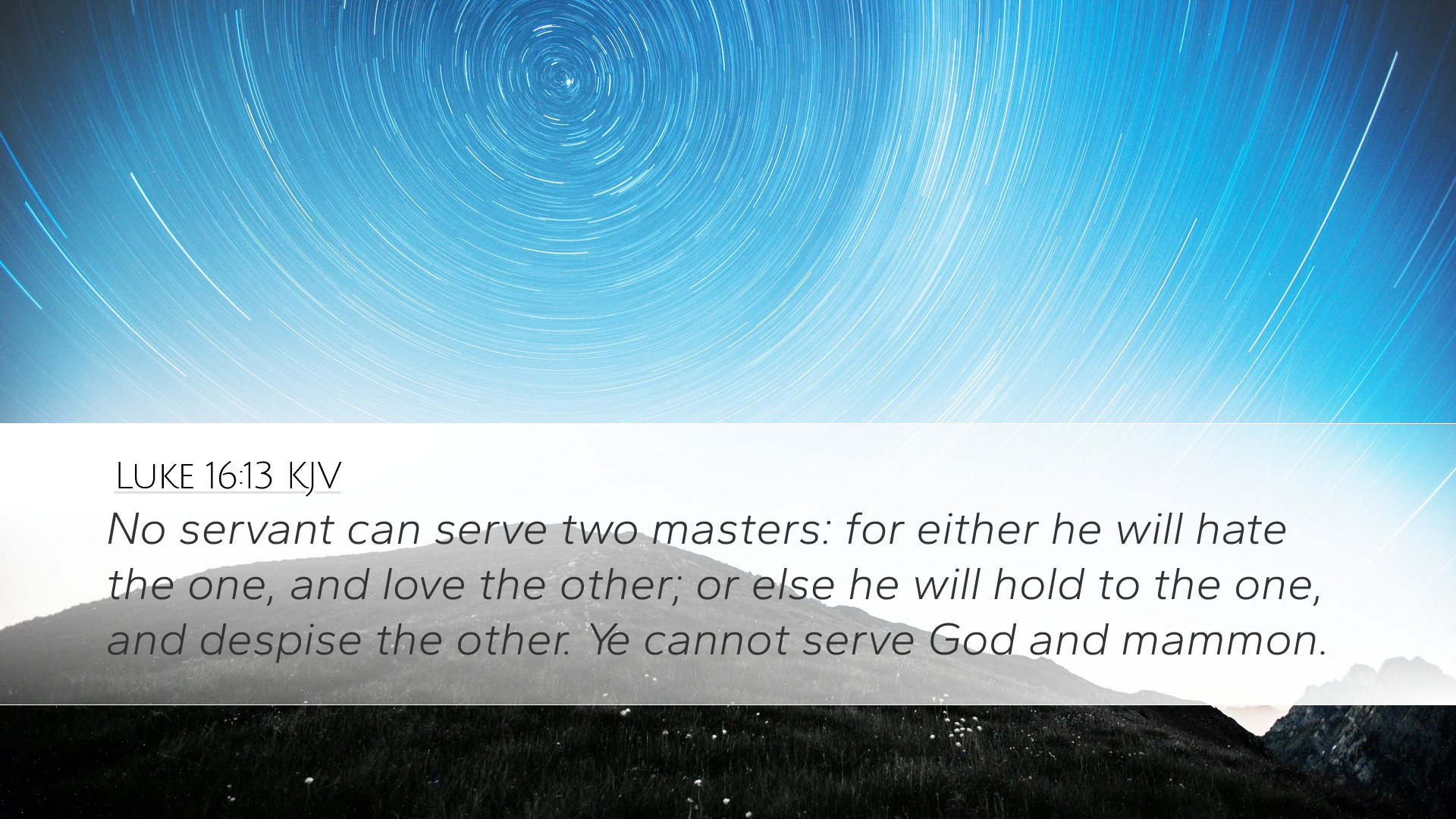Commentary on Luke 16:13
Luke 16:13 states: "No servant can serve two masters; for either he will hate the one and love the other, or else he will hold to the one and despise the other. Ye cannot serve God and mammon." This verse brings to the forefront a crucial teaching of Christ regarding loyalty and service, serving as a cornerstone for understanding the nature of our commitments and affections in the spiritual realm.
Contextual Overview
The profound implications of Luke 16:13 emerge within a broader context of Jesus’ teachings about wealth, stewardship, and eternal values. This chapter follows the parable of the unjust steward, highlighting the tension between earthly riches and heavenly priorities. Jesus uses this opportunity to warn against divided loyalties and the impossibility of serving multiple masters.
Exegesis and Analysis
Servanthood Concept: The term "servant" (or "slave") in this context illustrates the nature of commitment and loyalty. Both Matthew Henry and Adam Clarke emphasize that servitude to masters was culturally significant in Jesus’ time, representing deep allegiances that determined one's actions and priorities.
Dualism in Service: The idea of serving two masters introduces a duality that cannot coexist harmoniously. Albert Barnes points out that the notion of divided loyalty is not only impractical but impossible; a servant must choose. This duality features two competing realms: the spiritual (representing God) and the temporal (represented here by "mammon," or wealth). The use of "hate" and "love" starkly illustrates the emotional and ethical backlash of divided service.
The Mastership of God
The Call to Loyalty: Serving God involves unwavering loyalty. According to Henry, this call to loyalty emphasizes complete devotion. It challenges the believer to examine their heart, determining if worldly concerns overshadow their commitment to God. This loyalty is relational and covenantal, requiring trust and submission to God's authority.
The Concept of Mammon
Mammon Defined: The term "mammon" is derived from an Aramaic word for wealth, conveying the idea of material riches as a false god. Clarke's commentary highlights that mammon can become a competing deity, one that demands worship through our service and prioritization of material success over spiritual truths.
Contrast to God: Barnes notes that mammon, while it may promise security and satisfaction, ultimately leads to spiritual desolation. When wealth becomes the primary focus, it diverts attention from God and the pursuit of righteousness, fostering a false sense of security that detracts from true faith.
Practical Implications for Believers
Understanding this verse invites several practical implications for modern believers:
- Assessment of Priorities: Believers are encouraged to evaluate their priorities and how they manage resources and commitments. Are material pursuits overshadowing spiritual responsibilities?
- Call to Generosity: A loyal servant of God will reflect His character through acts of charity, helping others, and sharing wealth for the kingdom's advancement.
- Faith Over Fear: Trusting God rather than wealth allows believers to navigate life's uncertainties with confidence, knowing that God provides.
Theological Reflections
Divine Sovereignty: This verse reflects God's sovereignty over all aspects of life. Serving God exclusively acknowledges His rightful dominion over every area, including finances and relationships.
Coronation of Christ: The exclusivity of Christ's lordship posits Him as King, reinforcing the requirement for all believers to yield allegiance to Him above all else.
Conclusion
In conclusion, Luke 16:13 serves as a profound reminder of the believer's call to singular devotion. The verse encapsulates the essence of Christian discipleship, rooting faith in the recognition of God’s supreme authority over both spiritual and material realms. Through the teachings highlighted by both Matthew Henry, Albert Barnes, and Adam Clarke, we see the gravitas of this divine principle—it urges a deep reflection on whom we truly serve.


